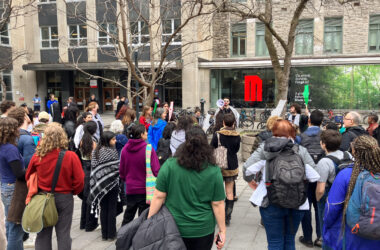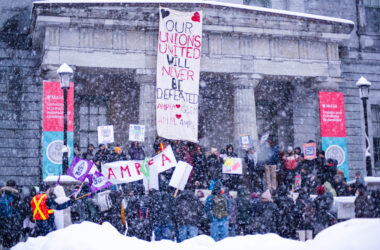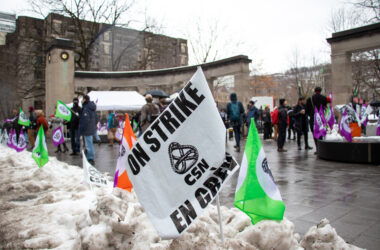 Michael Paolucci / McGill Tribune
Michael Paolucci / McGill Tribune Michael Paolucci / McGill Tribune
Michael Paolucci / McGill TribuneOver 200,000 people marched through the streets of downtown Montreal on March 22 to demonstrate against provincial tuition increases. The protest, the largest in Quebec history, came two days after the Quebec government released its annual budget, confirming that university tuition fees are set to increase by $1,625 over five years starting this September. According to some of the organizers, the protest spanned 50 city blocks at its peak.
Since February, 169 university and CEGEP student associations have voted to strike in protest of these proposed increases, forcing many universities and CEGEPs to cancel class.
Over 500 McGill students gathered at the Roddick Gates at noon before heading to Place du Canada, the meeting point for the protest, at 1 p.m. Thousands of students sporting signs, wearing red clothes and red face paint met in the square. At about 1:40 p.m., the crowd started marching through downtown Montreal.
Rachel Mulbry, a U2 Middle Eastern studies student who attended a similar protest against tuition fee increases on Nov. 10, emphasized the positive mood of the protest.
“There’s a really good energy, and it feels very positive and pretty inclusive,” she said. “It’s been a lot of time since November, and even speaking for myself, I understand what I feel more and how this issue relates to me … I think these intervening months have been very good for education.”
Although the majority of participants were university and CEGEP students, there were many other protesters, including professors, high school students, unions, opposition party representatives as well families with small children.
“I’m a primary [school] teacher and I wish my students [could] go to high school or, if they want, university and CEGEP,” David Marquis, a first grade teacher in the South Shore, said. “I hope they don’t have to interrupt their studies because they can’t afford [the tuition].”
The march finished in Place Jacques Cartier in the Old Port and featured speeches by Helöise Moysan Lapointe, member of the Profs Contre la Hausse collective and Gabriel Nadeau-Dubois, spokesperson for the Coalition large de l’Association pour une Solidarité Syndicale Ãtudiante (CLASSE), a Quebec-wide temporary coalition of students opposing tuition increases and one of the primary groups organizing the protest.
“It was an unbelievable protest [and] I think we just made history,” Nadeau-Dubois said after addressing the crowd. “It’s the biggest protest in the history of Quebec, so I think students of Quebec should be very proud of their generation.”
Nadeau-Dubois noted that representatives from the student movement have not been able to discuss tuition fee increases with the provincial government.
“We’ve had no meetings with the government in the past year and we hope [we can meet] as soon as possible,” he said. “This government systematically refuses to discuss tuition fees with the student movement.”
Previously, Education Minister Line Beauchamp has cited irreconcilable views as a basis for not negotiating.
“The student associations are defending two options-one wants to talk about completely free [education], the other wants to maintain the freeze and send the bill to other people,” Beauchamp told The Canadian Press after the protest. “It’s a bit of ‘not in my backyard’ and that can’t be a basis for discussion.”
Moysan Lapointe cited the “government’s intransigence” as a reason for the large turnout.
“The student movement has given many proposals for refinancing education, proposals that seem, to us profs, more interesting than those of the government’s,” she said in French. “The ball’s in the government’s court.”
Despite the size of the protest, there were no injuries, according to Arnell LeBlanc, VP Operations for the Concordia Emergency Response Team, an organization that worked with the Fédération étudiante universitaire du Québec (FEUQ) to provide security and first aid.
“There were some little fist fights but we managed to disperse them, and the crowd would just boo the people to the point they’d stop fighting,” LeBlanc said. “No one actually got hurt, it was a good day.”
Montreal police confirmed that there were no arrests or violent incidents over the course of the protest.
“Everything was under control,” Yannick Ouimet, media relations officer for the Montreal police, said. “The students followed every street they told us they were going to go through.”
The protest ended around 5 p.m., when people started leaving the Old Port. Several individuals collected signs from garbage cans and placed them in flowerpots in Place Cartier as a reminder of the protest.
“The signs are valuable,” Steve Risdon, a special care counselor, said in French. “This is a non-violent, pacifist movement … we decided to gather the signs to [continue the protest’s visibility.]”








